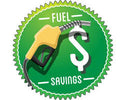
Saving money on fuel in trucking
, by Maria Decker, 3 min reading time

, by Maria Decker, 3 min reading time
Fuel Efficiency Mastery: Cutting Costs for Trucking Companies and Owner Operators
In the trucking industry, fuel isn't just a necessity; it's one of the largest expenses. With fluctuating fuel prices, trucking companies and owner operators constantly seek ways to cut costs and boost efficiency. This blog post explores effective strategies to reduce fuel consumption and save money, ensuring a healthier bottom line for your trucking business.
Section 1: Utilize Fuel Cards and Discounts Fuel cards not only offer convenience but also savings through discounts and rewards programs. They also allow for better tracking and management of fuel expenses. Research and choose a fuel card program that aligns best with your company’s needs and fueling locations. We highly recommend using trucking101.net, they are known for having one of the best discounts in the industry. trucking101.net
Section 2: Invest in Fuel-Efficient Vehicles While a significant upfront investment, purchasing fuel-efficient vehicles pays off in the long run. Modern trucks are designed with better fuel economy in mind, leveraging technologies like advanced aerodynamics and efficient engines. Regularly upgrading your fleet can lead to substantial fuel savings over time.
Section 3: Regular Vehicle Maintenance A well-maintained vehicle is a fuel-efficient one. Simple steps like regularly checking tire pressure, changing oil on time, and ensuring the engine is properly tuned can make a noticeable difference in fuel consumption. Implement a strict maintenance schedule to keep your fleet in top condition.
Section 4: Driver Training and Behavior Drivers play a crucial role in fuel consumption. Educating them about efficient driving techniques—such as avoiding excessive idling, maintaining steady speeds, and anticipating traffic flow—can lead to significant fuel savings. Consider investing in driver training programs that focus on fuel-efficient driving habits.
Section 5: Use of Aerodynamic Add-Ons Aerodynamic improvements to trucks can reduce air resistance and improve fuel efficiency. Installing add-ons like side skirts, roof fairings, and streamlined mirrors can help in achieving better mileage. Although these modifications require an investment, the fuel savings they yield can be substantial.
Section 6: Monitor Fuel Usage Keeping a close eye on fuel usage helps in identifying inefficiencies and areas for improvement. Implementing a fuel management system allows for detailed tracking of fuel consumption, helping in making informed decisions to reduce costs.
Section 7: Leverage Bulk Fuel Purchases Buying fuel in bulk often comes with cost advantages. Negotiating with fuel suppliers for bulk purchase discounts can lead to significant savings, especially for larger fleets. Building strong relationships with suppliers can also open doors to additional perks and discounts.
Section 8: Optimize Route Planning Efficient route planning is key to reducing unnecessary mileage. By avoiding congested areas, taking shorter routes, and minimizing empty return trips, trucking companies can significantly cut fuel costs. Utilize advanced GPS and routing software to plan the most fuel-efficient routes, taking into consideration factors like traffic patterns and terrain.
Conclusion: Fuel costs are a variable but controllable expense in the trucking industry. By adopting strategies such as efficient route planning, investing in modern vehicles, regular maintenance, driver training, aerodynamic improvements, vigilant fuel monitoring, bulk purchases, and utilizing fuel cards, trucking companies and owner operators can significantly reduce their fuel expenditures. Implementing these strategies requires effort and sometimes upfront investment, but the long-term savings are well worth it.
Have you tried any of these strategies in your trucking operations? Share your experiences and tips in the comments below. For more insights and practical advice on running a cost-effective trucking business, don’t forget to subscribe to our blog!